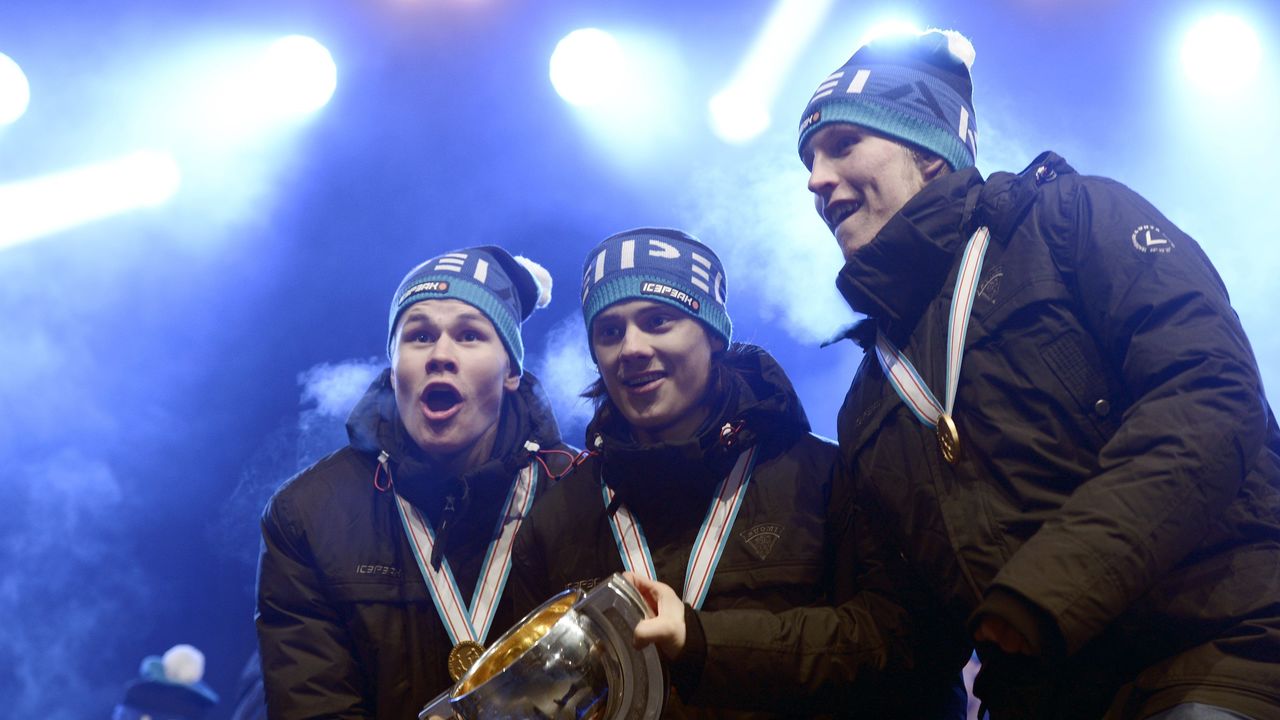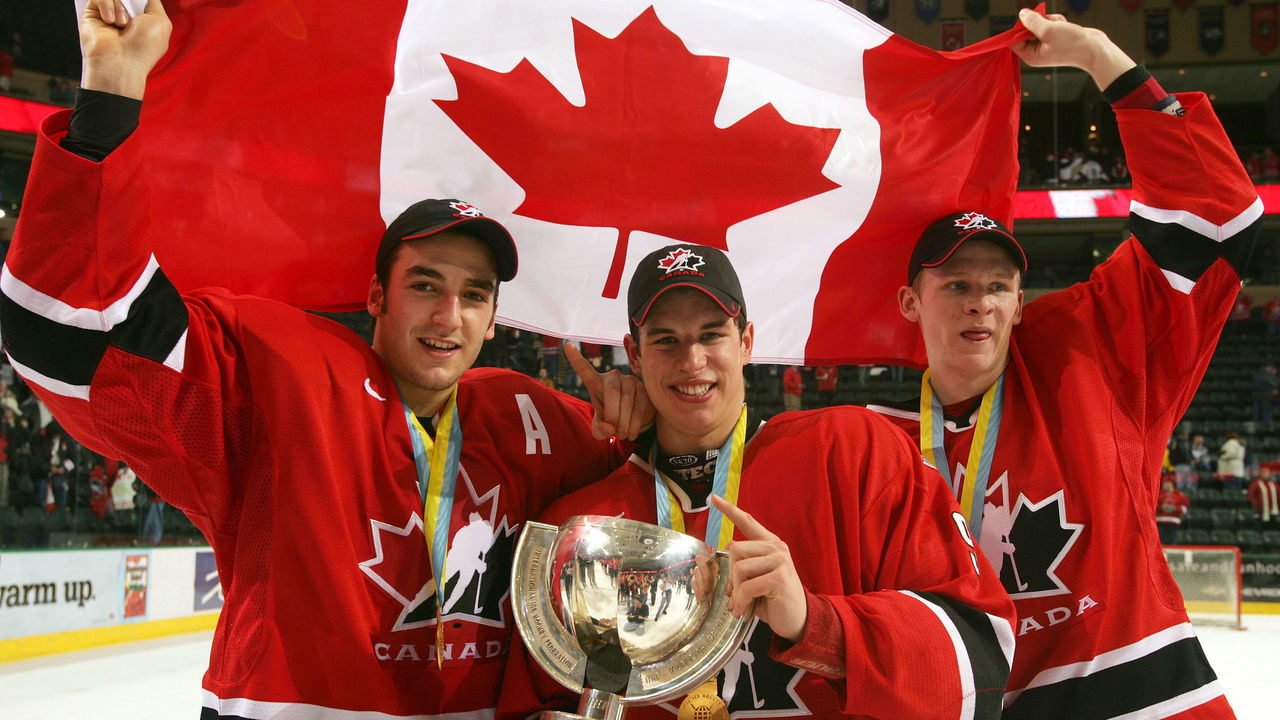5 of the most exciting teams in world junior history
The annual World Junior Championship treats fans to the best young talent across the hockey world. Throughout the years, countries have assembled teams filled with future NHL stars or, sometimes, players who shone at the tournament before fizzling out.
Let's take a look at five of the most exciting teams to hit the ice at the world juniors.
Finland, 2016
There are few things more exciting than watching a host nation captivate its home crowd. The 2016 Finland squad did just that in Helsinki by claiming the country's fourth-ever gold medal at the tournament.
Led by the dynamic trio of Sebastian Aho, Patrik Laine, and Jesse Puljujarvi, the Finns didn't exactly cruise to an easy championship. They faced some incredibly stiff competition along the way, which included a tight 6-5 victory over Canada in the quarterfinals, a 2-1 win over Sweden in the semis, and a thrilling 4-3 overtime victory against Russia in the finals.

Puljujarvi led the tournament in scoring with 17 points in seven games, while Aho and Laine finished second and third with 14 and 13 points, respectively. The team was rounded out with defenseman Olli Juolevi, forwards Mikko Rantanen, Kasperi Kapanen, and Roope Hintz, and goaltender Kaapo Kahkonen who played all games in the playoff round. Puljujarvi was named tournament MVP, while he, Juolevi, and Laine were handed All-Star nods.
Soviet Union, 1989
The Soviet Union absolutely dominated the competition in 1989, led by a trio of future superstars - Alexander Mogilny, Pavel Bure, and Sergei Fedorov. Both Mogilny and Fedorov had already established some solid chemistry during the '88 tournament, but the 17-year-old Bure put the Soviets over the top.
At the time, the world juniors didn't feature a playoff round - it was simply a round-robin tournament. The Soviets went 6-1-0, with their sole loss coming against Czechoslovakia. They held the highest goal differential in the tournament by far, scoring 51 goals while conceding just 14 in seven games. Sweden, who finished in second place with an identical record, scored 39 and allowed 14.
Americans Jeremy Roenick and Mike Modano finished the tournament first and second in scoring, respectively, but the United States was forced to settle for fifth place. Bure ended his tournament in third, while Mogilny and Fedorov finished fifth and sixth.
The 1989 world juniors ultimately marked the final gold medal for the perennially contending Soviet Union.
Sweden, 1993
Sweden just missed out on the gold medal in 1993 but was still the tournament's best squad. Its top two players - Peter Forsberg and Markus Naslund - put on what many consider to be the most dazzling world junior performances of all time.
Due to the round-robin format, Canada won gold with an identical 6-1-0 record, ultimately edging out Sweden due to a narrow 5-4 victory in the nations' second game of the tourney.
Canada finished with a respectable 37 goals scored and 17 against, but those numbers paled in comparison to Sweden's monstrous differential of 53 goals scored and 15 against. Forsberg set a tournament record by scoring 31 points in seven games, while Naslund also set a record with 13 goals. The team didn't feature a ton of depth beyond Forsberg and Naslund, but the two were so dominant on their own and skated circles around the competition.
Canada, 2005

Canada has certainly put together some of the greatest teams in world junior history. Over the past few decades, all eyes always seem to be on the Canadians entering the tournament, and they're often touted as favorites. While the team has iced some fantastic rosters through the years, the one that won gold in 2005 was on another level.
The team included future NHL stars Sidney Crosby, Patrice Bergeron, Ryan Getzlaf, Shea Weber, Jeff Carter, and Corey Perry. Beyond them, there was still plenty of talent that rounded out the roster, including Dion Phaneuf, Mike Richards, Brent Seabrook, and Andrew Ladd.
In 2005, the stacked Canadian team ran roughshod over its competition. The Canadians went 4-0-0 in the preliminary round, scoring 32 goals and allowing just five. They beat the Czech Republic 3-1 in the semifinals before breezing past Russia with a 6-1 drudging in the gold-medal game. Canada wasn't in danger for seemingly a single second on its way to a first gold medal since 1997.
Bergeron was named MVP after leading the tournament in scoring with 13 points through six games, while Getzlaf trailed just behind with 12. Crosby and Carter, both 17 years old, also finished inside the top 10 in scoring.
United States, 2013
The Americans have iced numerous incredible teams over the years, but 2013 may have been their most well-rounded and dominant one to date. John Gibson may have put on one of the best goaltending performances in the tournament's history, but that doesn't mean the team in front of him wasn't stacked, either.
The blue line featured players such as Seth Jones, Jacob Trouba, and Shayne Gostisbehere. The forward group consisted of names like Johnny Gaudreau, J.T. Miller, Alex Galchenyuk, and Vincent Trocheck. The scoring was spread out, with Gaudreau, Trouba, and Miller leading with nine points apiece, while Galchenyuk and Jones finished with eight.
The Americans didn't fare too well in the round robin, winning twice and losing twice. But they turned on the jets once the playoff round began. They inflicted a 7-0 beatdown of the Czech Republic in the quarterfinals before humiliating a solid Canadian squad 5-1 in the semis. The U.S then took care of Sweden in the finals, winning 3-1.
Gibson allowed just nine goals all tournament, with only two of them coming during the playoff round. He finished with a .955 save percentage and unsurprisingly took home MVP honors.
HEADLINES
- Slovakia stuns Finland in Olympic men's hockey opener
- Why this could be the most thrilling Olympic men's hockey tournament yet
- What does Brad Marchand, first-time Olympian, have up his sleeve?
- 2026 Olympic men's hockey predictions: Podium, MVP, and more
- Top Shelf: Charting paths to Olympic gold for USA, Canada